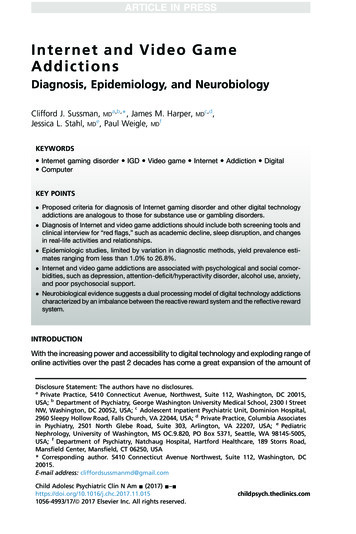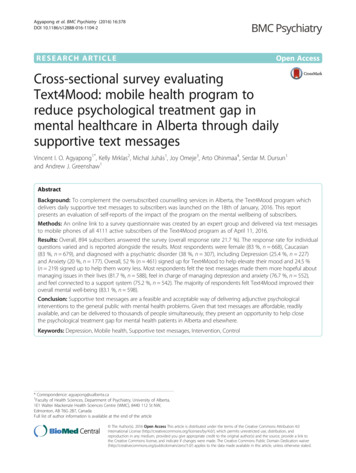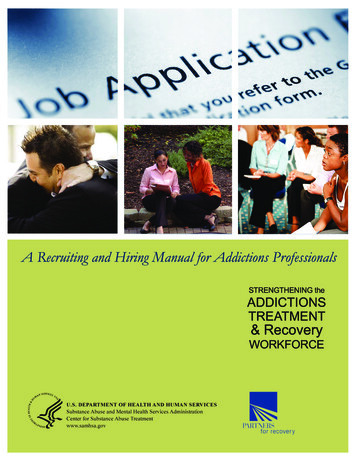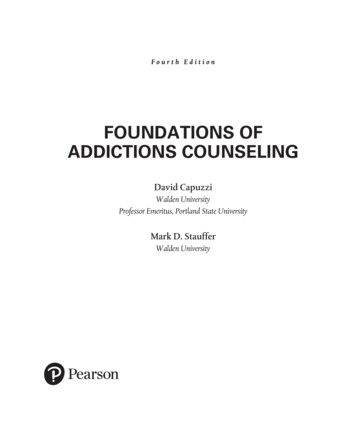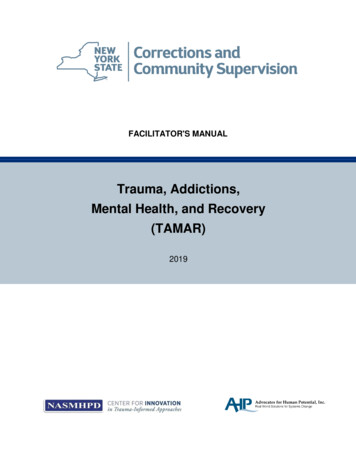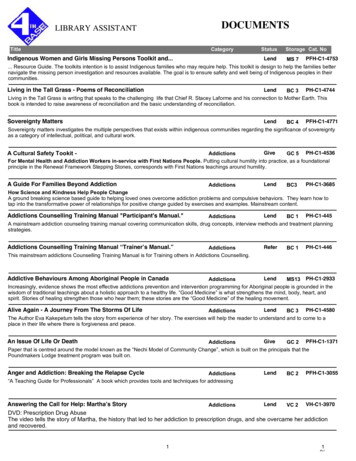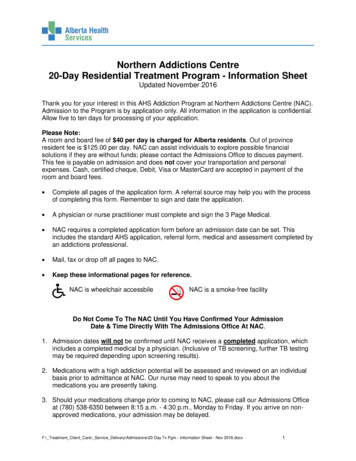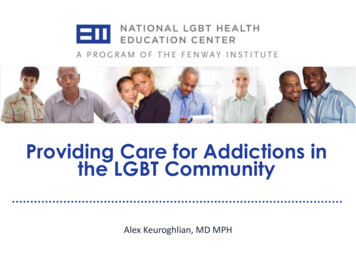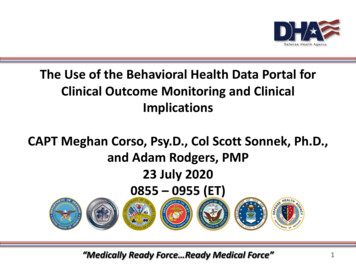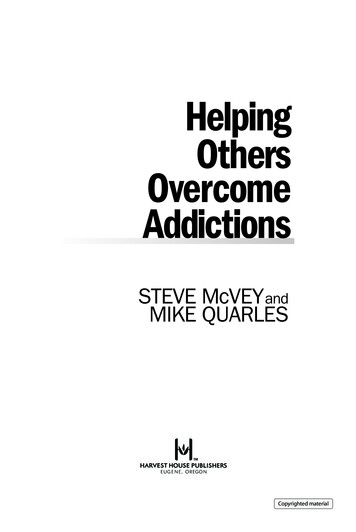
Transcription
Copyrighted materialHelping Others Overcome Addictions.indd 35/3/12 2:23 PM
All Scripture quotations, unless otherwise indicated, are taken from The Holy Bible, New International Version NIV . Copyright 1973, 1978, 1984, 2011 by Biblica, Inc. Used by permission. Allrights reserved worldwide.Verses marked NASB are taken from the New American Standard Bible , 1960, 1962, 1963, 1968, 1971,1972, 1973, 1975, 1977, 1995 by The Lockman Foundation. Used by permission. (www.Lockman.org)Verses marked NKJV are taken from the New King James Version. Copyright 1982 by ThomasNelson, Inc. Used by permission. All rights reserved.Verses marked NLT are taken from the Holy Bible, New Living Translation, copyright 1996, 2004.Used by permission of Tyndale House Publishers, Inc., Wheaton, IL 60189 USA. All rights reserved.Verses marked KJV are taken from the King James Version of the Bible.Verses marked MSG are taken from The Message. Copyright by Eugene H. Peterson 1993, 1994,1995, 1996, 2000, 2001, 2002. Used by permission of NavPress Publishing Group.Verses marked AMP are taken from The Amplified Bible, Copyright 1954, 1958, 1962, 1964, 1965,1987 by The Lockman Foundation. All rights reserved. Used by permission. (www.Lockman.org)All emphasis (italics) in Scripture quotations has been added by the authors.Cover by Koechel Peterson & Associates Inc., Minneapolis, MinnesotaCover photo Hemera/ThinkstockBack-cover author photo of Mike Quarles by Vernon TerrellAdvisoryThis book is not intended to take the place of sound professional advice, medical or otherwise. Neither the author nor the publisher assumes any liability forpossible adverse consequences as a result of the information contained herein.HELPING OTHERS OVERCOME ADDICTIONSCopyright 2012 by Steve McVey and Mike QuarlesPublished by Harvest House PublishersEugene, Oregon 97402www.harvesthousepublishers.comLibrary of Congress Cataloging-in-Publication DataMcVey, Steve, 1954Helping others overcome addictions / Steve McVey and Mike Quarles.p. cm.ISBN 978-0-7369-4746-6 (pbk.)ISBN 978-0-7369-4747-3 (eBook)1. Church work with recovering addicts. 2. Recovering addicts--Religious life. I. Quarles,Mike. II. Title.BV4460.3.M38 2012259'.429—dc232011050763All rights reserved. No part of this publication may be reproduced, stored in a retrieval system, ortransmitted in any form or by any means—electronic, mechanical, digital, photocopy, recording, orany other—except for brief quotations in printed reviews, without the prior permission of the publisher.Printed in the United States of America12 13 14 15 16 17 18 19 20 / VP-SK / 10 9 8 7 6 5 4 3 2 1Copyrighted materialHelping Others Overcome Addictions.indd 45/3/12 10:36 AM
To my wife, Julia, who has always been there with unwavering lovein my journey to freedom in Christ.—Mike QuarlesTo my sons, Andrew and David, whose constant faith in all the highsand lows of life has never been anything less than exemplary.—Steve McVeyCopyrighted materialHelping Others Overcome Addictions.indd 54/30/12 3:01 PM
AcknowledgmentsTo Brennan Manning, who introduced me to grace; to thememory of Bill Gillham, who opened the door to freedom; toTom Grady, who gave someone like me with a checkered pastan opportunity to minister; to Neil Anderson, who had enoughfaith in me to coauthor four books with me.And to Herb Sims, my pastor and friend, who always confrontsand challenges me with the stark truths of grace; to Vernon Terrell, who co-labors with me in the webinars and makes thempossible; to all my supporters, who have made it possible for meto be in this ministry; and to Steve McVey, with whom I havethe privilege of ministering the truth that sets us free.—Mike QuarlesRMy ministry has been a team effort since the day I left the pastorate in 1994. Much gratitude goes to the GraceWalk team,who are co-laborers together with me in spreading the wonderful message of our Father’s redemptive and restorative love.From our GraceWalk group leaders to our staff members, eachone encourages, impacts, and inspires me.My wife, Melanie, has always been my greatest counselor,encourager, and example of Christlikeness. Add to that theunsurpassed qualities she possesses as a precious wife, and noman could be more blessed.It was from Mike Quarles’s personal story that I first heard thewonders of grace. What an honor to now be coauthoring a bookwith him!Finally, I must acknowledge my heavenly Father and His lovinggrace. It is from Him that any good in my life has come.—Steve McVeyCopyrighted materialHelping Others Overcome Addictions.indd 64/30/12 3:01 PM
ContentsIntroduction: The Big Myth . . . . . . . . . . . . . . . . . . . . . . . . . . . . . .9Part 1:The Truth We Need to Help PeopleFind Freedom from Addictive BehaviorChapter 1: The Lie the Church Believes About Addiction . . . . . . . And how it keeps so many from finding freedom in Christ15Chapter 2: It’s Worse Than a Disease . . . . . . . . . . . . . . . . . . . . . . . A biblical perspective on addiction and its root cause25Chapter 3: The Prerequisite to Freedom from Addiction . . . . . . . . What has to take place before a person can receive theirfreedom, and why many never experience it37Chapter 4: The Birthright of a Child of God . . . . . . . . . . . . . . . . . God has already provided everything we need to be free in Christ47Chapter 5: If I’m So Good, Why Do I Act So Bad? . . . . . . . . . . . . Why we struggle, fall, and fail—and why we don’t have to61Chapter 6: The Most Liberating Thing You Will Ever Do . . . . . . . Forgiving from the heart: An act of spiritual warfare71Chapter 7: It’s Not Up to Us . . . . . . . . . . . . . . . . . . . . . . . . . . . . . We can’t free or sanctify ourselves, but God has already done it83Part 2:Practical Ways We Can Point People to the TruthChapter 8: What We Can Do to Help Others—andWhat to Stop Doing . . . . . . . . . . . . . . . . . . . . . . . . . . . . . . . . . Speaking the truth in love and exercising tough love97Copyrighted materialHelping Others Overcome Addictions.indd 74/30/12 3:01 PM
Chapter 9: A Ministry of Grace in the Church . . . . . . . . . . . . . . . 115 Welcoming, accepting, loving, caring for,and attracting those who struggle with addictive behaviorsConclusionLiving in the Freedom Christ Has Provided . . . . . . . . . . . . . . . . . 125 Summing up the truth and reality of who you are andwhat you have in ChristA Final Encouragement . . . . . . . . . . . . . . . . . . . . . . . . . . . . . . . . . 133Appendix:Format for FreedomSetting Up a Ministry, Part 1 . . . . . . . . . . . . . . . . . . . . . . . . . . . . . 137 Presenting the right contentSetting Up a Ministry, Part 2 . . . . . . . . . . . . . . . . . . . . . . . . . . . . . 147 Formats and resourcesResourcesA.B.C.D.E.F.G.H.I.J.K.L.M.N.The Ultimate Deception . . . . . . . . . . . . . . . . . . . . . . . . . . . .What’s Wrong with the 12 Steps? . . . . . . . . . . . . . . . . . . . . . .The Finished Work of Christ . . . . . . . . . . . . . . . . . . . . . . . . .Thirty Things Mike Tried to Get Freefrom Addictive Behavior . . . . . . . . . . . . . . . . . . . . . . . . . . . .Declaration of Deliverance, Freedom, and Victory in Christ .The Way to Live the Victorious Christian Life . . . . . . . . . . . .Grace Walk Recovery Resources . . . . . . . . . . . . . . . . . . . . . . .What Grace Walk Recovery Ministry Can OfferYour Church or Recovery Ministry . . . . . . . . . . . . . . . . . . . .Guidelines for Group Leaders . . . . . . . . . . . . . . . . . . . . . . . .Prayers to Begin and End Recovery Meetings . . . . . . . . . . . . .Guidelines for Group Discussion and Sharing . . . . . . . . . . . .Guidelines for Mentors . . . . . . . . . . . . . . . . . . . . . . . . . . . . .Selecting a Mentor . . . . . . . . . . . . . . . . . . . . . . . . . . . . . . . . .There Is Now No “How” for Those Who Are in Christ Jesus hted materialHelping Others Overcome Addictions.indd 84/30/12 3:01 PM
IntroductionThe Big MythIt has been 15 years since I (Mike) coauthored Freedom from Addictionwith Dr. Neil Anderson. I am more convinced than ever that Neiland I clearly presented the truth that sets people free from addictionin that book and its companion resources. But as I’ve directed a recovery ministry for the last 16 years, I’ve observed that it doesn’t follow thatpeople find freedom when they are confronted with the truth. Theremust be an encounter with Christ and a revelation of the Holy Spirit.There are major obstacles to this that very few have any awarenessof. The biggest is the myth that most Christians and the church at largehave bought and propagated about the problem of addiction and itsanswer. We (Mike and Steve) address this myth in the first chapter.From there we proceed with the threefold purpose of this book:1. To address the question of, first, why so few people findfreedom from addiction and, second, what has to takeplace before this can happen in their lives and they can goto help others find freedom from addictive behavior.2. To present the truth that God has already provided theanswer for addiction, what that answer is, and how it canbe experienced.3. To show the way you can help those struggling withaddictive behavior find freedom and, further, how you can9Copyrighted materialHelping Others Overcome Addictions.indd 94/30/12 3:01 PM
10 Helping Others Overcome Addictionshave a recovery ministry through which people can findtrue and lasting freedom in Christ.I (Mike) normally get several calls a week from people looking forChristian treatment centers for themselves or loved ones. Not verymany Christians, including pastors, are aware that there are many ofthem. We have accumulated a list of over 50, but not all of them incorporate the teaching a person needs to know to find freedom. Briefly,that teaching is an understanding of grace knowing who God is knowing what Christ accomplished on the crossand provided for us the truth that sets people free an understanding of our identity in ChristBasically, it is comprehension of the finished work of Christ. Ourgoal here is to set forth what we believe is essential to finding freedomin Christ for the individual and how you can help others find freedomin Christ.Between the two of us, Mike has nearly 40 years of full-time Christian ministry with more than 20 of it in recovery work; Steve has hadover 40 years’ experience in ministry. We are laying out our heartfeltpassion and vision for those caught in the bondage of addiction andhow we can help them.RAs you get into this book you might start to think, Why don’t theytell me what to do? Therein lies a major part of the problem. Pardonour Southern, but there are forty eleven dozen Christian programs andthousands and thousands of secular programs that will tell you what todo. However, no one ever got saved, freed, or sanctified by doing anything. No one ever will. Five hundred years ago Martin Luther declaredCopyrighted materialHelping Others Overcome Addictions.indd 104/30/12 3:01 PM
The Big Myth 11that nothing you do helps you spiritually.* Only the truth will set youfree (John 8:32,36), and our response to the truth must be faith only.If a program is not firmly founded on the truth you can work ituntil the cows come home or the Lord comes back, but you will not getfree. You may change your behavior for a while and fool a few people(including yourself), but nothing really changes. It may be a valianteffort—religious, noble, and even spiritual—but it will all be in vainand totally futile. Only God can change us, and our part is to exercisefaith—that is, to believe the truth of what He has done and what Hesays. We are saved by faith in Him alone and the Christian life is livedby faith in Him alone. We are also freed from addiction and sanctified by faith in Him alone. “Sanctify them by the truth; your word istruth” ( John 17:17).RIn part 2 of this book and in the “Format for Freedom” appendix,we give you some practical ways to help those struggling with addictive behavior and to set up a recovery ministry for those who are interested. But we implore you to read part 1 first. No one will be able toreally help a person until he or she has a biblical understanding of theproblem and God’s answer for it. If we try to help others without thisunderstanding, our efforts will most likely be counterproductive.It is not that there isn’t a widespread acknowledgment of the addiction problem. There are more programs available and more moneythrown at the problem than ever before. Is it getting any better? No, itis worse than it has ever been. It is an epidemic here in America and allover the rest of the world. There is a saying in Alcoholics Anonymousthat is said to have come from Albert Einstein: Insanity is continuingto do the same thing and expecting different results. Maybe AA, treatment centers, the church, recovery ministries, and rescue missions needto heed this wisdom, because what most are doing is not working.So we encourage you to do yourself a favor—and do a favor to thoseyou would like to see experience freedom from addictive behavior:* See Martin Luther, Christian Liberty (Philadelphia PA: Fortress Press, 1957), p. 8.Copyrighted materialHelping Others Overcome Addictions.indd 114/30/12 3:01 PM
12 Helping Others Overcome AddictionsRead this book with an open mind. In order to get free a person willhave to change what they believe and what they think, because addiction exists only because the person has been deceived and is believinga lie.Pray that God will give you a spirit of wisdom and revelation in theknowledge of Him (see Ephesians 1:17). That’s the only way anyonefinds freedom—in Him (Christ). He is the way and the truth and thelife ( John 14:6). He didn’t come to show us a better way. He is the Way.He didn’t come to give us truth so we could follow principles, steps, orany program to live life and get our act together. He is the Truth. Hedidn’t come to give us a better life. He is the Life, and He came to giveus His Life, which is eternal, abundant, and victorious. Can that reallybe true? Yes—that is the gospel, and it is true.Copyrighted materialHelping Others Overcome Addictions.indd 124/30/12 3:01 PM
Part 1The Truth We Needto Help PeopleFind Freedom fromAddictive BehaviorCopyrighted materialHelping Others Overcome Addictions.indd 134/30/12 3:01 PM
Copyrighted materialHelping Others Overcome Addictions.indd 144/30/12 3:01 PM
Chapter 1The lie the ChurchBelieves About AddictionAnd how it keeps so many from findingfreedom in ChristI(Steve) was a pastor of local churches for 21 years. I saw my share ofpeople enslaved in the bondage of addiction. When I first met MikeQuarles and heard him speak, I sat in stunned silence. I wonderedif Mike was an anomaly, one of those modern-day miracles you hearabout but almost never see in person. After all, here was a man who alsohad been a pastor; he had been to seminary; he had enjoyed a successfulcareer; he had enjoyed a wonderful marriage—and had then seen it allgo away because of an addiction to alcohol. I had heard of stories similar to this—it was nothing new. Men who lose it all because of poorchoices they have made aren’t that unusual. I had heard of those, butI’d never met anybody who had sunk to the depths Mike had seen, lostit all, and then, despite the stigma and shame of such a fall, had comeback to a place of effective ministry.As Mike described how he had literally become a falling-downdrunk and then continued on to tell how understanding who he is inChrist transformed him, I sat transfixed. At that time I didn’t knowmy own identity in Christ. I had my own struggles with the flesh andcouldn’t shake off the bad habits I saw in my life. Some might thinkthem mild in comparison to Mike’s drinking binges, but the truth wasthat my sins were as reprehensible as his, despite the opinion of thechurch world to the contrary.15Copyrighted materialHelping Others Overcome Addictions.indd 154/30/12 3:01 PM
16 Helping Others Overcome AddictionsI had earned a postgraduate degree with a focus on biblical counseling, but my pastoral counseling ministry fit the description Mike gaveof legalistic counseling. Through the years I’d told countless addictedpeople the religious things they needed to do to bring them freedom.Now Mike was telling our group that everything I had told these people wasn’t the answer. What could I say? The proof was in front of me.I’d seen little success in helping people find lasting freedom from addictions. On the other hand, here was a man who had found that freedomand who was so comfortable in it that he now spoke openly about apast that many would have been ashamed to admit. (That’s one of thegreat things grace produces in a person—transparency.)In the days ahead, I would come to understand the truths Mikeintroduced to me in the teaching I heard on that day in the autumnof 1990. My life too would be transformed as I found freedom frommy own addiction—the insatiable need to find love, acceptance, andvalue from others through success as a pastor, which I described in myfirst book, Grace Walk.RHere we are now, almost 20 years later, working as colleagues in thesame ministry, pointing many to the Freedom we have both found tobe validated by what we’ve seen of His effect in our own lives. (Freedomhas a name—Christ.) Our desire is to see churches become the clarionvoice of freedom to all who find themselves enslaved. To be that voice,though, it is important that we get it right when it comes to the message we share. The sad fact is that while the church talks about JesusChrist being the answer, an outsider could understandably come to adifferent conclusion by watching the way we usually try to help people with addictions.I (Mike) read an article in Christianity Today that said that nearlyevery Christian recovery ministry is based on the 12 Steps. Why is that?Why does the church go to the secular to find an answer? Is the problem of addiction too hard for God? It would seem that way. Admittedly,any addictive behavior—from sex, drugs, alcohol, and gambling toCopyrighted materialHelping Others Overcome Addictions.indd 164/30/12 3:01 PM
The Lie the Church Believes About Addiction 17workaholism, materialism, and codependency—appears all but impossible to get free from. A Christian counselor once said that most peoplenever change. He is right. In our combined years of ministry—morethan 70 years—that has been our observation. Most don’t. But somedo. That’s why we are both still in ministry.Who are the ones who change? That’s what this book is about. It’sthe ones who don’t accept and believe the lie most Christians believeabout addiction. Because as long as one believes the lie, their chancesof getting free from anything are as good as those a snowball has of notmelting in hell.Is Christ Insufficient?What is the lie? Glad you asked. The lie the church believes is this:Addiction is so difficult to get free from that we need more than what Godhas provided in Christ—and it is up to us to do what we need to do.*We know that no self-respecting Christian would ever put it thatway, but our actions demonstrate that this is our actual belief. This isthe ultimate deception that keeps us from experiencing the freedomChrist purchased for us on the cross, which is our inheritance and ourbirthright as a child of God. Many believe you need Christ, but youalso need something else, such as a program (a 12-Step one, preferably), a treatment center (usually secular), regular attendance at meetings (daily is recommended), and so on.If we focus on observing principles orfollowing steps, we focus on self to changeour behavior and shape ourselves up.Most of the treatment centers and the meetings (secular or Christian) use the 12 Steps. What’s wrong with them? Absolutely nothing.We believe that anyone who works the 12 Steps will improve the qualityof their life. However, the Steps will not set you free.† Only Christ can* For further discussion, see “The Ultimate Deception” in the Resources at the back of this book.† For more on this point see “What’s Wrong with the 12 Steps?” in the Resources section.Copyrighted materialHelping Others Overcome Addictions.indd 174/30/12 3:01 PM
18 Helping Others Overcome Addictionsdo that, and when He sets you free you are free indeed ( John 8:36). Nonumber of steps can lead to freedom unless Jesus Christ is the sourcefrom which that freedom is derived.You can study Alcoholics Anonymous (usually called “The Big Book”),the history of AA, and the autobiography of Bill Wilson (one of thetwo founders of AA) and find nothing in any of them to point you tothe person of Christ and His finished work on the cross. What they dopoint you to is the 12 Steps and what you must do. Here’s a truth thatwould keep us from wandering away: If the message and ministry don’tpoint to Christ and His finished work, consider them good advice atbest and error at worst. There is a multitude of very good advice andrecommendations out there, but as Paul said in Colossians 2:23, “theylack any value in restraining sensual indulgence.”Likewise, there is nothing wrong with the Celebrate Recovery program’s Eight Recovery Principles, which are based on the beatitudes.But there are no principles, steps, rules, laws, methods, or programsthat will free you from addiction. The only way to change behavior isby faith in what Christ has already done. What we need to do is knowwhat He accomplished on the cross—and who we are and what wehave as a result of that. If we focus on observing principles or following steps, we focus on self to change our behavior and shape ourselvesup—“to overcome hurts, habits and hang-ups,” as Celebrate Recovery puts it.The Effects of the LieWhen I (Mike) was struggling with alcoholism, I was a member ofthe largest church in its denomination. It was probably the most evangelistic and most respected evangelical church in the state. Their initial counsel to me was to go to AA meetings. Later, after I was broughtbefore their discipline committee because of my drunkenness, theysent me to a secular treatment center. I believe that what they did wasmotivated by love for me and that they truly wanted to help me. Ifthat was so, why do I call their actions “spiritual malpractice”? Whydid they not help me? Why would that excellent church send me toa secular treatment center that, because of its cost and my precariousCopyrighted materialHelping Others Overcome Addictions.indd 184/30/12 3:01 PM
The Lie the Church Believes About Addiction 19financial condition due to my addiction, almost bankrupted me—andstill didn’t help the problem? Because they believed the lie that I neededsomething more than what God had provided.When I (Steve) counseled people who were addicted, I often gavethem the same kind of advice. I was sincere, and my counsel was basedon the knowledge I had, but I seldom saw any lasting transformationin the life of anyone who was deeply entrenched in addiction. Mostpastors and churches seem to find themselves in the same place I was.They aren’t intentionally giving bad advice. They’re just telling peoplewhat they believe to be true, despite the fact that it does little more thanput a Band-Aid on the problem.We understand that perspective because we believed it for manyyears. My (Mike’s) thinking went like this: I have been struggling withaddiction for eight long, miserable years. I am destroying everything in mylife that is good. I’ve been a Christian for 18 years, I’m a seminary graduateand a former pastor, and I’ve tried everything I know and everything anybody has suggested. And nothing helps. It seems that the gospel works formy wife. She’s a good person and is able to trust God and do the right thing.But I’m too messed up, and my problem is too bad and too deep for it towork for me. I need something different. I need more. I need to go to meetings every night. I need to go to an expensive treatment center.*All of the counseling I received told me the same thing. Not exactlyin those terms, but I was told that because of my problem I neededsomething drastic. In recommending I attend AA, one of the pastorsof the church said, “You need to do whatever it takes. Gouge out youreye. Cut off your hand.” The message came across loud and clear. Theanswer was for me to do whatever was necessary to become somethingI wasn’t (righteous) and to get something I didn’t have (freedom). Theseare two of the biggest lies Christians believe, and although those whopromote them may be sincere, they are incredibly effective in keeping those who are addicted from experiencing the truth that wouldset them free.When I checked into my second treatment center I had completely* See “Thirty Things Mike Tried to Get Free from Addictive Behavior” in the Resources section.Copyrighted materialHelping Others Overcome Addictions.indd 194/30/12 3:01 PM
20 Helping Others Overcome Addictionsbought the lie. I’d given up all hope of being a good Christian. I justwanted to be a normal person. If God had said to me, “I’ll let you be anormal person—show up for your job, come home at night, and be adecent husband,” I would have accepted it in a heartbeat.At the intake interview for this Christian treatment center, its director told me, “Maybe one day you could go back into ministry.” Itsounded like a cruel joke at the time. It was so far-fetched I couldn’teven consider it. Not me. The ministry was for people who had ittogether and didn’t mess up like me. I was so ashamed that I begged thedirector not to tell the other guys in the program I was a former pastor.I believed I had fallen so far and failed so badly that there was no possibility God would ever use or bless me again.The tragic reality was that as long as I believed that lie, I would wallowin my self-pity and be of no use to anyone. Lies keep people in bondage.A number of years ago I encountered a prime example of how widespread this lie is among those who are in recovery ministry. I conducteda “Freedom from Addiction” workshop at a meeting of the International Union of Gospel Missions. At one of the luncheons I was seatednext to the director of all the rescue missions in a certain overseas country. When he learned the story of my struggle with addiction, he askedme, “What is your personal program to stay free and not drink?” Iresponded, “In all likelihood, it is essentially the same as yours. Thatis, to know I’m dead to sin and freed from it, and to trust Christ as mylife and live by faith.”The man was incredulous. I didn’t have a program of what I didevery day to keep me on track and not drink. He believed I was analcoholic and would always be one. He was certain I was one step away,or one drink away, from plunging back into the throes of addiction.He said it was up to me and what I did to not get drunk. Because hebelieved so strongly in this, all the rescue missions in his country gaveeveryone a program of what they should do to stay sober and clean.The question in my mind was, Is anyone finding freedom in Christ?Most likely some were. God is not limited, and He can work in anybody anywhere in any program He chooses. But as Oswald Chamberssaid, the only valid ministry anyone has is to point people to Christ.Copyrighted materialHelping Others Overcome Addictions.indd 204/30/12 3:01 PM
The Lie the Church Believes About Addiction 21Moving Toward RealityIn Romans 7:24, the apostle Paul directs us to the ultimate answerfor freedom. He asks, “Who will set me free?” It is significant that hedidn’t ask “What will set me free?” What you do, follow, or observewill not set you free from addiction. Only a Person can do this. Wemay find that wise steps can strengthen healthy behavior and indeedbe helpful, but anytime we think we need anything else to be a goodChristian, a good spouse, a good parent, or a good minister, or to getfree or be sanctified, we have bought the lie that we need somethingmore than Christ. We are complete in Him, and you cannot get anymore complete than that.If we look to Him and focus on what He has done, we believe thetruth that we don’t need to shape ourselves up and get our act together.Why? Because the old self was crucified with Christ. It is dead and buried and is no more (Galatians 2:20). Martyn Lloyd-Jones put it this way:Understand that the old man is not there. The only wayto stop living as if he were still there is to realize that he isnot there. That is the New Testament method of teachingsanctification. The whole trouble with us, says the NewTestament, is that we do not realize what we are, that westill go on thinking we are the old man, and go on tryingto do things to the old man. That has been done; the oldman was crucified with Christ. He is non-existent; he isno longer there. If we but saw this as we should, we wouldreally begin to live as Christians in this life.*In other words, if we try to shape up the old person who is not there,this is nothing but trying to shape up and improve the flesh, which cannot be shaped up (see John 6:63). There was nothing in the old personthat you were that could be shaped up. There is nothing in our fleshthat can be improved. So God took care of the problem, and we cansay with Paul, “We know that our old self was crucified with him so* D. Martyn Lloyd-Jones, Romans: Exposition of Chapter 6, The New Man (Carlisle, PA: Banner ofTruth, 1992).Copyrighted materialHelping Others Overcome Addictions.indd 214/30/12 3:01 PM
22 Helping Others Overcome Addictionsthat the body ruled by sin might be done away with, that we shouldno longer be slaves to sin—because anyone who has died has been setfree from sin” (Romans 6:6-7). We were raised up with Christ and arenew creations (2 Corinthians 5:17). The new person we are is dead tosin and is holy, righteous, and blameless. We are in Christ, Christ is inus, and Christ is our life.
From there we proceed with the threefold purpose of this book: 1. To address the question of, fi rst, why so few people fi nd freedom from addiction and, second, what has to take place before this can happen in their lives and they can go to help others fi nd freedom from addictive behavior.
